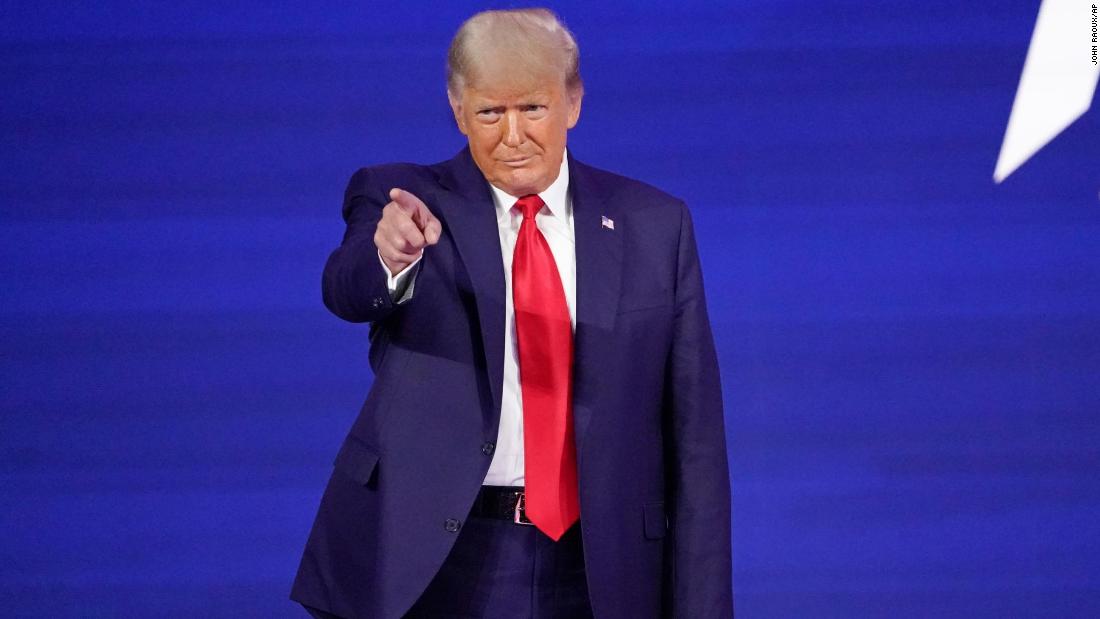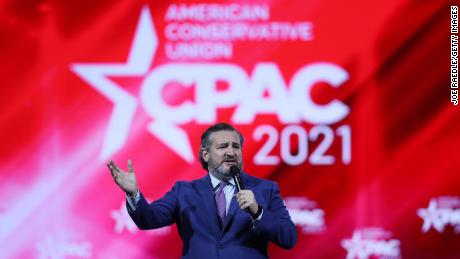Analysis: Trump unleashes new threat to American democracy
Last seen leaving Washington in disgrace, the ex-President’s self-regarding wander through old political fights emphasized his obsession with revenge at a time when the attention of the majority of the nation not in his camp is concentrating on more immediate concerns.
The embittered former commander in chief, however, was locked in his false but damaging alternative reality, to which millions of his followers subscribe, that he was the victim of a massive election fraud effort.
His latest comments suggest that the fight to safeguard US democratic institutions and free elections did not end when he left the White House but will be a key struggle in the run-up to the next presidential election.
As local and state Republicans seek to narrow access to the polls, Trump, who tried to force officials in Georgia to steal the election for him, called on the GOP to outlaw mail-in and early voting to ensure “honest elections” and made racially motivated insinuations about irregularities in Detroit and Philadelphia. He demanded citizen tests for ballot access, said voting should only take place on Election Day and called for independent judges to be barred from adjudicating election disputes.
“The Republicans have to do something about it. They better do something about it,” he said
The ex-President’s warning could be so damaging because he is effectively making his support for GOP candidates in the 2022 midterms contingent on them backing his false claims of a corrupt election in 2020. And in the shorter term, he is seeding even more suspicion about his exit from the White House with conservative voters, while providing more potential motivation for extremist groups who support him.
In such a way, Trump’s corrupting influence could harm faith in the fairness of US elections, the bedrock of US democracy for months or years into the future.
Naming his enemies
In a further inflammatory move, Trump also called out by name Republican lawmakers who voted to impeach him in the House and convict him in the Senate for his assault on the Constitution, including Reps. Liz Cheney of Wyoming and Adam Kinzinger of Illinois and Sens. Ben Sasse of Nebraska and Mitt Romney of Utah. His singling of them out demonstrates his intention to exact revenge in upcoming primaries and could leave them vulnerable to harassment as they travel around the country.
Trump’s speech, apparently intended to further radicalize followers who have already shown they are willing to embrace violence, was carried live on Fox News and other conservative outlets in an unfiltered stream of falsehoods.
Trump got his biggest cheer when he refreshed the lie that he won in November, then embarked on multiple flagrantly false claims of fraud. His fury put down a marker that any Republican who wants his endorsement and to prosper with the party’s base must now support his dangerous lies about the last election being stolen.
“I may even decide to beat them for a third time,” said the one-term former President who never won the popular vote and failed to crack 50% in presidential approval polls while in office. Several times, Trump implied to his delighted crowd that he could end up back in the Oval Office.
“With your help, we will take back the House. We will win the Senate. And then a Republican president will make a triumphant return to the White House,” Trump said.
“And I wonder who that will be.”
Trump’s unhinged conduct and attacks on his successor so soon after leaving office represented a historical aberration. Yet such is the blowtorch that Trump trained at the traditions of the presidency that they came as no surprise. In fact, a show of restraint would have been more notable from an ex-President who often put personal grievances above the national interest.
Pilgrimage of 2024 hopefuls
To begin with, Trump’s big comeback speech was a low-energy elegy for his own presidency and an extended whine about Biden’s early policies. His delivery lacked the enthusiasm and sparks of humor that made his speeches compelling political theater early in his 2016 campaign.
But the pilgrimage of senior Republican politicians who made the trip to Florida, including potential 2024 candidate like Sens. Ted Cruz of Texas and Josh Hawley of Missouri, demonstrated Trump’s unbroken hold on the Republican grassroots.
Trump’s inflammatory language and new push to dismantle the infrastructure of elections is likely to mean more frustration for Republican leaders in Washington who are trying to build opposition to the current President’s Covid rescue package in the Senate but who will now be assailed by questions about Trump’s new insurrectionary rhetoric against the Supreme Court.
There was no doubt about the former President’s desire to remain the dominant figure in the Republican Party. The question is whether performances such as Sunday’s will retain resonance months down the road or whether Trump’s inevitable time out of the spotlight will dampen his aura even among his devoted fans.
Trump accused Biden of having the worst beginning to a new presidency in history, even though the Democrat’s approval ratings are at levels his predecessor never reached. He demanded that kids must go back to school now, playing into the frustration of parents, but ignoring his own negligence in fighting the pandemic that meant that in-person learning has been on hold for a year in many parts of the nation.
Trump offered a policy prescription of “America First” trade, draconian border enforcement, expanded oil and gas exploration, opposition to gun control and a crusade against what conservative cable hosts call cancel culture.
“In just one short month we have gone from America first to America last,” Trump claimed. But his angry comments on immigration, while mirroring his early rhetoric in the 2016 campaign, represented a reprise of the nativist rhetoric that alienated many suburban voters and may have helped lose him the presidency, and Republicans the House and Senate.
Trump’s appearance often lacked the freshness of turns from his proteges — like Florida Gov. Ron DeSantis and South Dakota Gov. Kristi Noem — until he reached the inflammatory rhetoric of his attack on the Supreme Court and claims of a stolen election.
![]()






